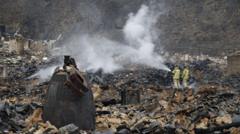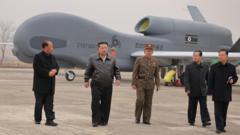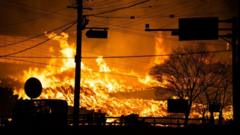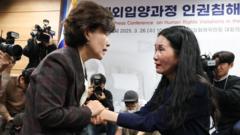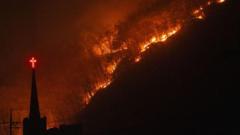South Korea is grappling with its most devastating wildfires in history, ignited by human activity and exacerbated by climate change, resulting in numerous casualties and widespread destruction, particularly affecting the elderly population.
Unprecedented Wildfires Devastate South Korea Amidst Climate Crisis
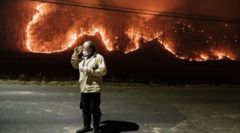
Unprecedented Wildfires Devastate South Korea Amidst Climate Crisis
Experts attribute the catastrophic wildfires in South Korea to strong winds, dry conditions, and the prevalence of pine forests, with significant loss of life and property.
In a shocking display of nature's fury, South Korea is undergoing its largest wildfires in recorded history, spurred by a combination of strong winds, dryness, and an abundance of pine trees. As of Thursday, these wildfires have scorched over 35,810 hectares (88,500 acres), an area nearly half the size of New York City, leading to the tragic loss of 27 lives and displacing thousands. The fires reportedly ignited from human actions but were intensified by a perfect storm of environmental factors including dry land conditions and strong inland winds.
Experts warn that the region's high density of pine forests is a critical fuel source, with these trees containing flammable resin that accelerates fire intensity. Forest disaster expert Lee Byung-doo explained that the presence of resin-laden pine trees makes southern regions particularly susceptible to wildfires, leading to devastating "crown fires" that spread rapidly through the treetops.
Although neighboring nations like China and North Korea have historically suffered from lower forest cover, South Korea has seen a significant increase in forest growth. However, this rise has contributed to the accumulation of combustible material—fallen leaves and dense pine trees—that has exacerbated the current wildfire situation, according to disaster prevention specialist Baek Min-ho. Climate change stands as a significant culprit, pushing temperatures up to 20 Celsius (68 Fahrenheit), unusually high for this time of year.
The combination of extreme heat and persistent winds has made firefighting efforts particularly challenging. Recently, a tragic incident occurred when a 73-year-old pilot lost his life in a helicopter crash while battling the flames. As authorities assess the human toll, many of the deceased are elderly, with South Korea facing a societal challenge as one in five citizens is aged 65 and above, complicating evacuation efforts.
A local resident from Andong described the panic and lack of preparedness in her community: "We had to leave with nothing, and all our belongings are gone." There are urgent calls for the government to provide suitable emergency shelters considering the significant elderly demographic suffering as a result of the disaster.
Cultural heritage has not been spared, with important historical sites, including temples dating back over a millennium, suffering catastrophic damage. As the nation grapples with the ongoing fires, acting President Han Duck-soo has expressed concern over the high casualty rate among the elderly and has directed relief efforts to prioritize their needs.
The wildfires have served as a stark reminder of the growing climate crisis, with citizens anxious about the future in the face of such unprecedented devastation.


